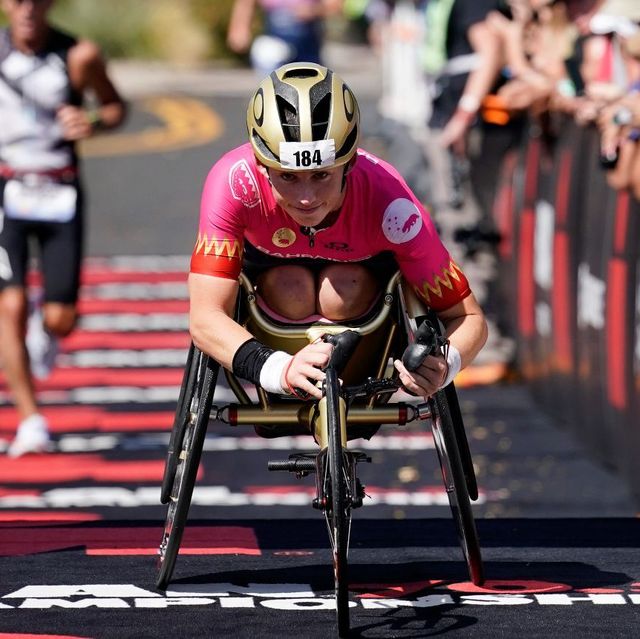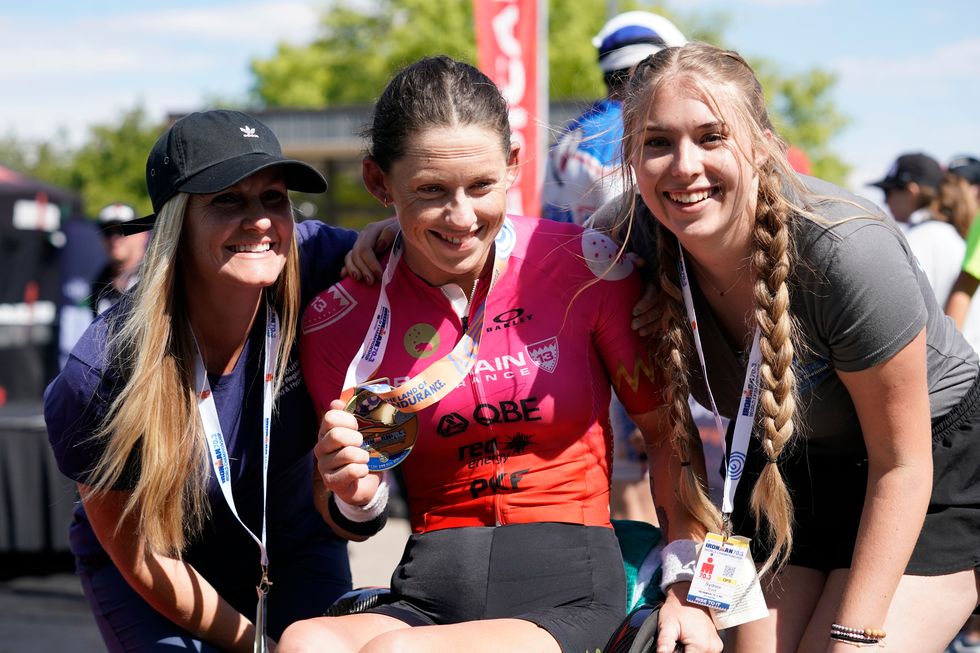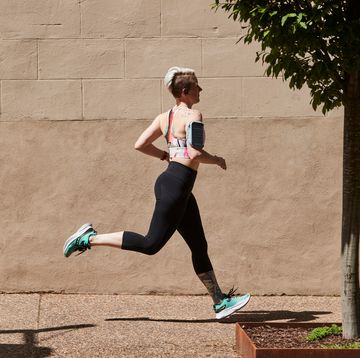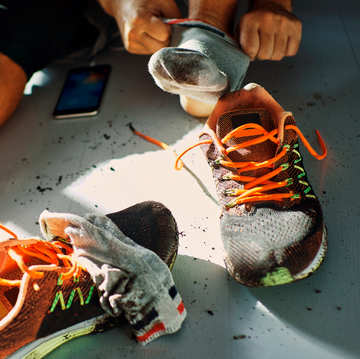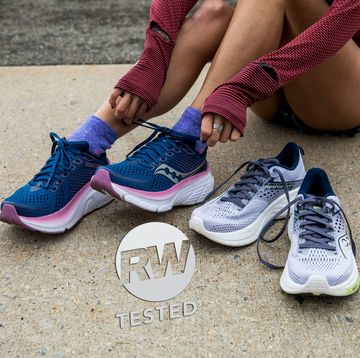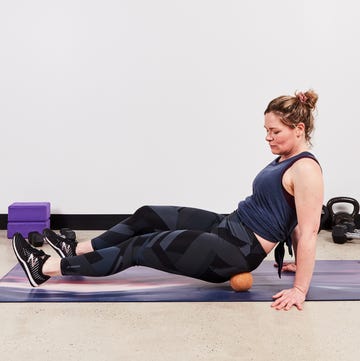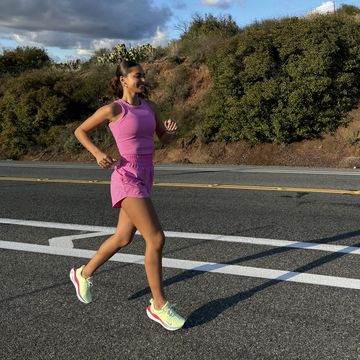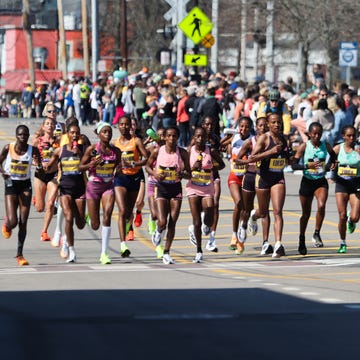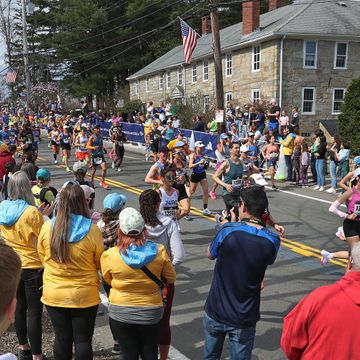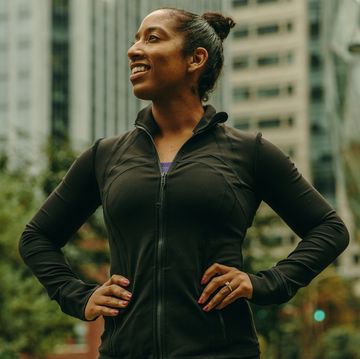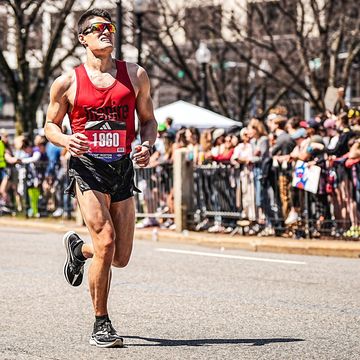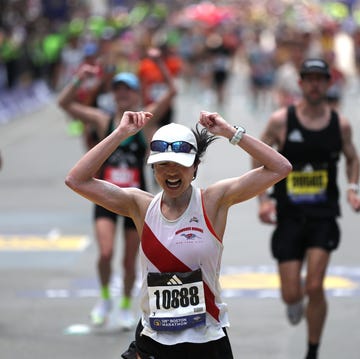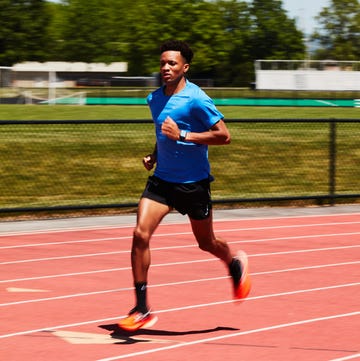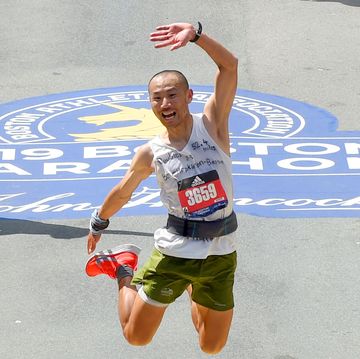“Can’t” is a word that rarely comes to mind for Lauren Parker. And on the rare occasion when it does, she uses her elite athlete speed to replace the negative thought with a positive one.
This skill became especially helpful on September 18 when the Paralympic silver medalist fought through a grueling triathlon in St. George, Utah—the site of the Ironman 70.3 World Championships. Less than a week after suffering third-degree burns on her toes caused by sunburn, Parker competed with the support of two nurses who dressed her wounds during the transitions between swimming, biking, and running.
When she started the run portion—two brutal 10K loops with a total elevation gain of 1,293 feet—the Australian paratriathlete was hit with another setback. A sudden rain storm caused Parker’s gloves to slip from the wheels of her racing chair, making each push that much harder to maneuver on the relentless hills.
Heading into the second loop, Parker said she experienced a moment of doubt, wondering whether she’d make it to the finish line in these conditions. But shortly after, she received a much-needed reminder from her friend and trainer Brad Fernley, who was cheering from the sidelines.
“He was talking to me, giving me that extra positivity and saying, I need to be in control of myself and my mind because if you've got control of your mind, you can do anything,” Parker told Runner’s World. “If you've got that positive mindset and never-give-up attitude, then that gives you that extra strength to get anything done. And that's just what I did.”
With six miles to go, Parker focused on one push at a time rather than the distance ahead of her. In seven hours, 54 minutes, and 43 seconds, she finished first in her division at the world championships—just four years after a bike accident left her a paraplegic. For Parker, conquering the St. George course was just one of many challenges she's faced head-on and overcome.
“It's really tough, especially when you think that it’s not possible, but when you change your mindset you know that anything is possible,” she said.
A Medal-Worthy Mentality
Throughout her career, Parker has leaned on a can-do approach to get through tragic circumstances. In April 2017, her life changed forever during a training ride when her tires burst, and she crashed into a guard rail. The accident left Parker with a punctured lung, broken ribs, shoulder blade and pelvis, and a damaged spinal cord. After a surgeon operated on her back, Parker was told that she would never walk again.
“Those are the most devastating words you can ever hear,” the world champion recalled. “My life was full of sport and I was always active and I felt like I had all that taken away from me, that I'd never ever be an athlete again and that I had nothing else to live for.”
While in treatment, Parker said one of her physical therapists confirmed her worst fear, but that only fueled her desire to come back to the sport she loves. “I chose to show them that that's wrong, that I can be an athlete again,” she said.
After spending six months in the hospital, Parker was introduced to paratriathlon through the Challenged Athletes Foundation—a nonprofit that supports people with physical challenges by providing the adaptive sports equipment and programming needed to be active. Bob Babbitt, the organization’s co-founder, invited Parker to visit for a race in San Diego, California, an experience that gave Parker much-needed hope in a difficult period of her life.
“What I saw [during the triathlon] was incredible,” she said. “I saw 500 people with disabilities that were far worse off than me that had big smiles on their faces and were having fun.”
A Return to Triathlons
When she flew back home to Australia, Parker was inspired to pursue triathlon once again. She got the equipment she needed to train, rebuilt her fitness, and the results followed right away.
Her first triathlon—the 2018 St. Kilda OTU Paratriathlon Oceania Championships—took place one month after she started training. She finished second and went on to place second a month later at the Devonport ITU Paratriathlon World Cup. In April 2018, Parker earned a bronze medal at the Gold Coast Commonwealth Games. The following year, she was crowned world champion at the 2019 ITU World Triathlon Grand Final Lausanne. And this summer, she earned Paralympic silver in the PTWC category in Tokyo.
Almost three weeks after the Paralympic Games, Parker was training for the Ironman 70.3 World Championships in Las Vegas, Nevada when she faced a major setback a week before the race.
She was resting her feet against the windshield of the car while her coach was loading up the bikes after their training session. It took him 40 minutes to pack all of the equipment, and by the time they were ready to leave, Parker had developed severe burns on her toes from the heat generated during a 113-degree day in the desert. The following day, she received treatment at a hospital in St. George, where she met the team of nurses who made it possible for her to compete at the championship just five days later.
“I was really able to race because I got the help from the nurses during transitions and before and after the race to redo the dressings on my feet,” she said. “If it wasn't for them, I wouldn't have raced.”
The medical professionals in her corner also helped propel her to a winning performance on the toughest course Parker said she’s ever tackled. “I really got it done for myself, but also for the nurses and the support team that I had around me,” she said.
A Look at the Future
Looking ahead on the legacy she wants to leave—including her long-term goal of winning Paralympic gold in Paris 2024—Parker hopes to encourage more para-athletes and able-bodied athletes to feel empowered by sports, an outlet she says saved her life.
“I really hope that from my performance and what I've had to overcome in the last four years, and my journey that it can really inspire others,” Parker said. “I just hope that I've done that from my race at the Paralympics plus everything I've had to overcome in my journey. If I had to have my accident for a reason, then that's what I want the reason to be, to inspire everyone with disabilities or without because everyone goes through tough times in life.”
To inspire athletes in a wheelchair, Parker shared some key recommendations and training advice on how to race. While her tips may target wheelchair racing specifically, let her positive mindset guide all athletes to keep pushing forward and persevering through any tough stretch—in life or on the road.
Lauren Parker's Tips for Wheelchair Racing
Practice Patience and Goal Setting
“It's really tough starting out, but keep going, don't give up. For me, the racing chair was the hardest piece of equipment that I had to get used to because it's very technical. The technique is really hard to get and I still haven't got it now. I'm still working on it, so just keep working hard and training hard. Set those short-term goals, but have that long-term goal as well so you've got that motivation to work towards.
When I think about the racing chair, I set weekly goals. I'll choose one part of the technique to work on to really get stronger for the push in a racing chair. And then the next week, I'll work on the last part of the push. You've got these special running gloves and where you hit on the push rim is really important and it's really hard to get. So, that's what I focused on initially, just to get that right.
Plus, you've got to fiddle around with the positioning of your body in the racing chair. As time goes on, your body changes. My body got smaller, so I had to get a new racing chair that was smaller, and that really helped my technique as well.
Sport is really a lifesaver, especially for people that have been able-bodied and then have had accidents, but also for people that have been in chairs their whole life, it's really great to get into sport.”
Build Strength
“Every week I had little training goals in the gym. I had certain muscles that I had to work on to achieve certain weights, but I was very patient and I think that's the key. Be patient and keep going. Train day in, day out and really enjoy it.
For my arms, I really had to stay consistent. That's another key aspect, stay consistent with your training. For me, I had two gym sessions a week that were one hour each. They were really key to my success to build up that arm strength. That also helped my bike sessions, my run sessions and also swimming.”
Focus on Technique and Support
“In my first couple of paratriathlons, I felt like I couldn't control the chair. It's really hard to control, especially when you come to a U-turn or a corner, you really have to use your ab muscles, and I've only got half the ab muscles. So to really lift the front wheel and get around a tight corner, at first I was running into the gutters. And the chairs are really hard to stop, especially at speed. So I felt like I was a bit silly at first, but that was one thing I really worked on so that I could conquer those U-turns and the corners. Otherwise, all the girls would catch me because I lost so many seconds.
For the Paralympics, I really conquered that. I got my chair and my positioning in the chair in a way that I could get around a corner really fast but it's something that you really have to play around with.
You have to find a coach that knows wheelchair racing and get advice from them and other athletes that have been in the sport for a long time. Other Australian athletes, like Louise Sauvage, Madison de Rozario, and Kurt Fearnley, who I became friends with in the wheelchair racing world, really helped me with my techniques and positioning in the chair. Having that support was really a huge benefit at the start of my career. And I hope that for new people getting into the sport, that I can be that person for them.”
Make It All About Positivity
“Know that there will be setbacks. It's only natural for anyone that has had a life-changing accident that are now in chairs wanting to get into sport. There's always going to be setbacks along the journey, but always choose to have that positive mind and choose to focus on the positives rather than the negatives, because there's so many negatives and so many people that want to tell you that you can't do it.
I believe that there's no such thing as the word ‘can’t.’ I like to think that people in chairs or with disabilities, we're just differently abled. We can do it, we just do things differently.”
Find Joy in the Process
“That's number one: You have to enjoy what you're doing to be able to reach your goals. If you don't enjoy it, then you need to find something else that you enjoy. For me, I love sports. I love the sport of triathlon and that was the easiest part out of the last four years. It was only natural to get back into triathlon again.”
This interview has been edited and condensed for clarity.
Taylor Dutch is a writer and editor living in Austin, Texas, and a former NCAA track athlete who specializes in fitness, wellness, and endurance sports coverage. Her work has appeared in Runner’s World, SELF, Bicycling, Outside, and Podium Runner.
